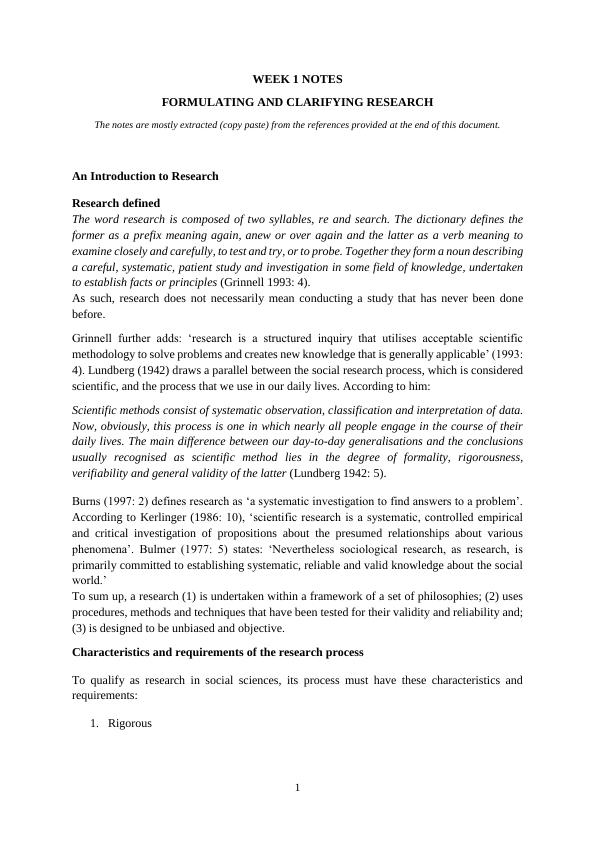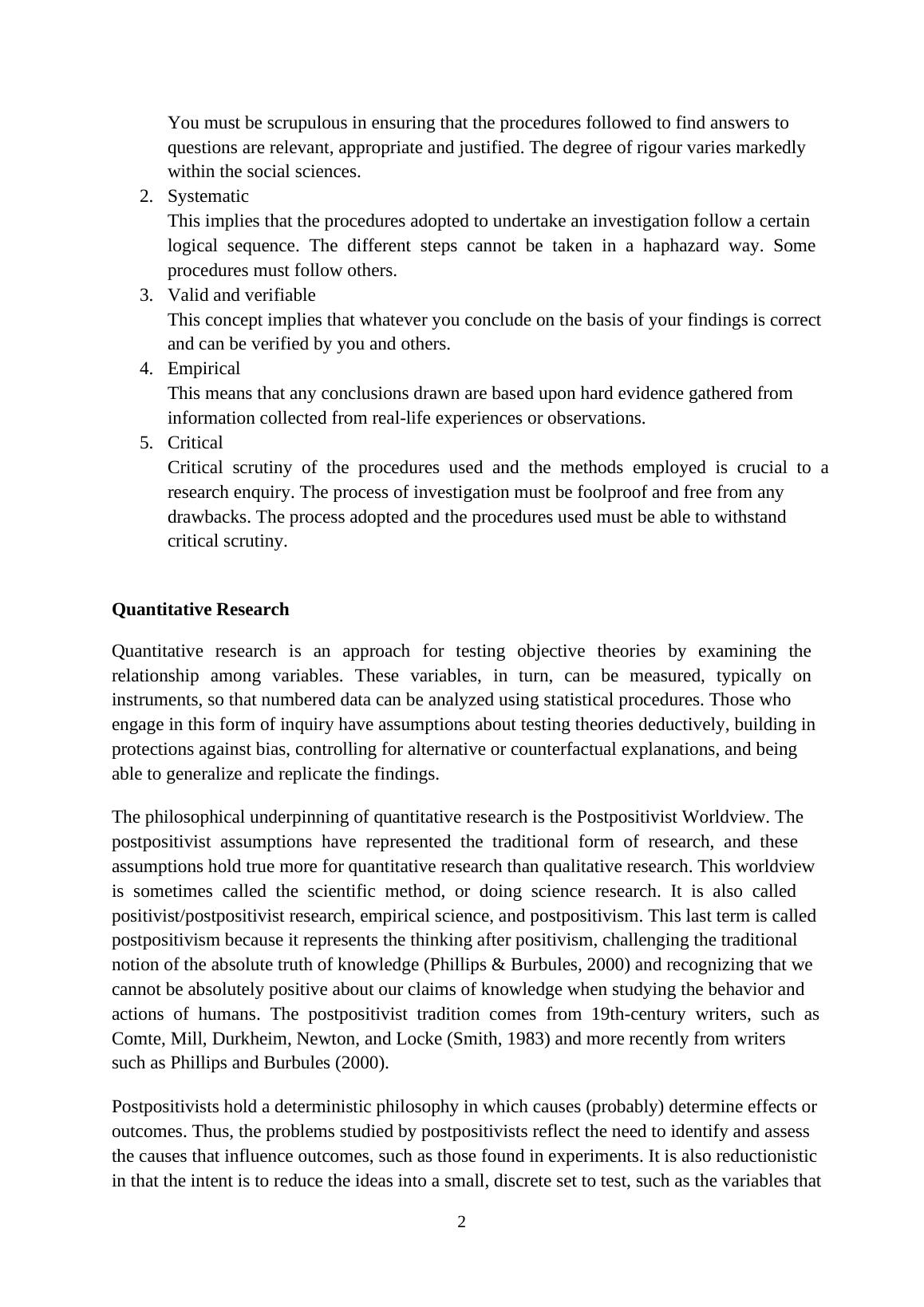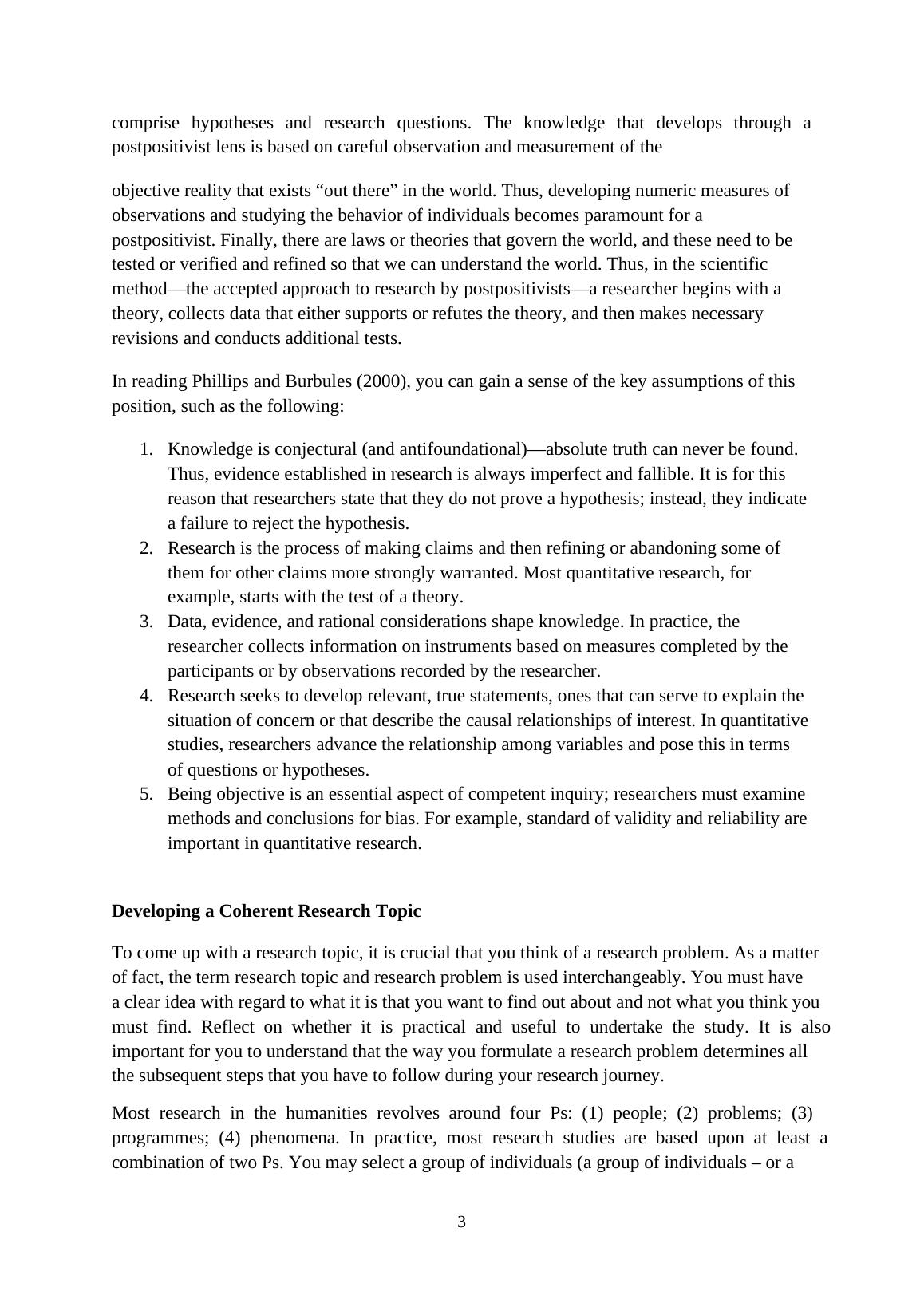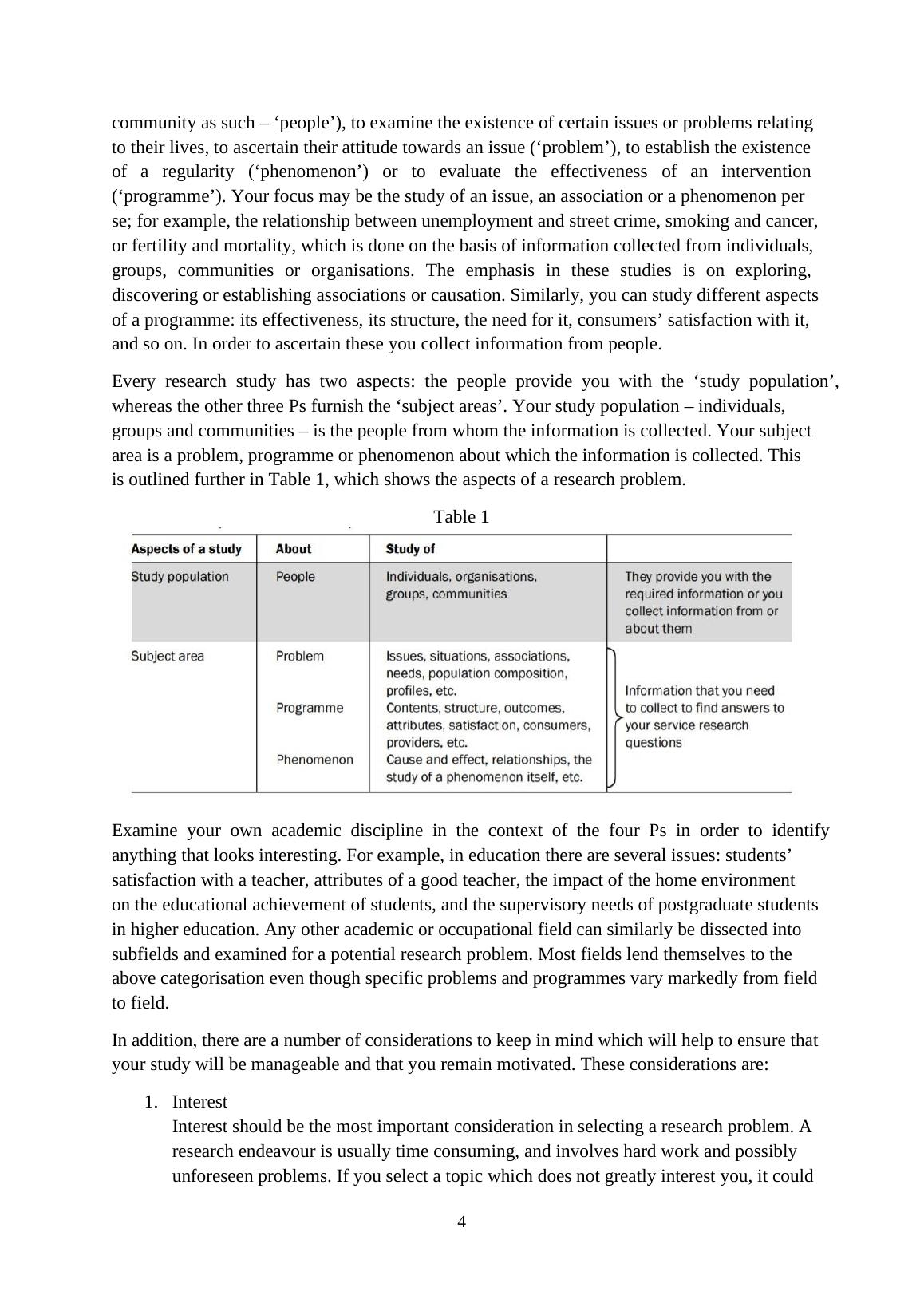Week 1 Notes | Formulating and Clarifying Research
12 Pages5468 Words26 Views
Added on 2022-09-02
Week 1 Notes | Formulating and Clarifying Research
Added on 2022-09-02
ShareRelated Documents
1
WEEK 1 NOTES
FORMULATING AND CLARIFYING RESEARCH
The notes are mostly extracted (copy paste) from the references provided at the end of this document.
An Introduction to Research
Research defined
The word research is composed of two syllables, re and search. The dictionary defines the
former as a prefix meaning again, anew or over again and the latter as a verb meaning to
examine closely and carefully, to test and try, or to probe. Together they form a noun describing
a careful, systematic, patient study and investigation in some field of knowledge, undertaken
to establish facts or principles (Grinnell 1993: 4).
As such, research does not necessarily mean conducting a study that has never been done
before.
Grinnell further adds: ‘research is a structured inquiry that utilises acceptable scientific
methodology to solve problems and creates new knowledge that is generally applicable’ (1993:
4). Lundberg (1942) draws a parallel between the social research process, which is considered
scientific, and the process that we use in our daily lives. According to him:
Scientific methods consist of systematic observation, classification and interpretation of data.
Now, obviously, this process is one in which nearly all people engage in the course of their
daily lives. The main difference between our day-to-day generalisations and the conclusions
usually recognised as scientific method lies in the degree of formality, rigorousness,
verifiability and general validity of the latter (Lundberg 1942: 5).
Burns (1997: 2) defines research as ‘a systematic investigation to find answers to a problem’.
According to Kerlinger (1986: 10), ‘scientific research is a systematic, controlled empirical
and critical investigation of propositions about the presumed relationships about various
phenomena’. Bulmer (1977: 5) states: ‘Nevertheless sociological research, as research, is
primarily committed to establishing systematic, reliable and valid knowledge about the social
world.’
To sum up, a research (1) is undertaken within a framework of a set of philosophies; (2) uses
procedures, methods and techniques that have been tested for their validity and reliability and;
(3) is designed to be unbiased and objective.
Characteristics and requirements of the research process
To qualify as research in social sciences, its process must have these characteristics and
requirements:
1. Rigorous
WEEK 1 NOTES
FORMULATING AND CLARIFYING RESEARCH
The notes are mostly extracted (copy paste) from the references provided at the end of this document.
An Introduction to Research
Research defined
The word research is composed of two syllables, re and search. The dictionary defines the
former as a prefix meaning again, anew or over again and the latter as a verb meaning to
examine closely and carefully, to test and try, or to probe. Together they form a noun describing
a careful, systematic, patient study and investigation in some field of knowledge, undertaken
to establish facts or principles (Grinnell 1993: 4).
As such, research does not necessarily mean conducting a study that has never been done
before.
Grinnell further adds: ‘research is a structured inquiry that utilises acceptable scientific
methodology to solve problems and creates new knowledge that is generally applicable’ (1993:
4). Lundberg (1942) draws a parallel between the social research process, which is considered
scientific, and the process that we use in our daily lives. According to him:
Scientific methods consist of systematic observation, classification and interpretation of data.
Now, obviously, this process is one in which nearly all people engage in the course of their
daily lives. The main difference between our day-to-day generalisations and the conclusions
usually recognised as scientific method lies in the degree of formality, rigorousness,
verifiability and general validity of the latter (Lundberg 1942: 5).
Burns (1997: 2) defines research as ‘a systematic investigation to find answers to a problem’.
According to Kerlinger (1986: 10), ‘scientific research is a systematic, controlled empirical
and critical investigation of propositions about the presumed relationships about various
phenomena’. Bulmer (1977: 5) states: ‘Nevertheless sociological research, as research, is
primarily committed to establishing systematic, reliable and valid knowledge about the social
world.’
To sum up, a research (1) is undertaken within a framework of a set of philosophies; (2) uses
procedures, methods and techniques that have been tested for their validity and reliability and;
(3) is designed to be unbiased and objective.
Characteristics and requirements of the research process
To qualify as research in social sciences, its process must have these characteristics and
requirements:
1. Rigorous

2
You must be scrupulous in ensuring that the procedures followed to find answers to
questions are relevant, appropriate and justified. The degree of rigour varies markedly
within the social sciences.
2. Systematic
This implies that the procedures adopted to undertake an investigation follow a certain
logical sequence. The different steps cannot be taken in a haphazard way. Some
procedures must follow others.
3. Valid and verifiable
This concept implies that whatever you conclude on the basis of your findings is correct
and can be verified by you and others.
4. Empirical
This means that any conclusions drawn are based upon hard evidence gathered from
information collected from real-life experiences or observations.
5. Critical
Critical scrutiny of the procedures used and the methods employed is crucial to a
research enquiry. The process of investigation must be foolproof and free from any
drawbacks. The process adopted and the procedures used must be able to withstand
critical scrutiny.
Quantitative Research
Quantitative research is an approach for testing objective theories by examining the
relationship among variables. These variables, in turn, can be measured, typically on
instruments, so that numbered data can be analyzed using statistical procedures. Those who
engage in this form of inquiry have assumptions about testing theories deductively, building in
protections against bias, controlling for alternative or counterfactual explanations, and being
able to generalize and replicate the findings.
The philosophical underpinning of quantitative research is the Postpositivist Worldview. The
postpositivist assumptions have represented the traditional form of research, and these
assumptions hold true more for quantitative research than qualitative research. This worldview
is sometimes called the scientific method, or doing science research. It is also called
positivist/postpositivist research, empirical science, and postpositivism. This last term is called
postpositivism because it represents the thinking after positivism, challenging the traditional
notion of the absolute truth of knowledge (Phillips & Burbules, 2000) and recognizing that we
cannot be absolutely positive about our claims of knowledge when studying the behavior and
actions of humans. The postpositivist tradition comes from 19th-century writers, such as
Comte, Mill, Durkheim, Newton, and Locke (Smith, 1983) and more recently from writers
such as Phillips and Burbules (2000).
Postpositivists hold a deterministic philosophy in which causes (probably) determine effects or
outcomes. Thus, the problems studied by postpositivists reflect the need to identify and assess
the causes that influence outcomes, such as those found in experiments. It is also reductionistic
in that the intent is to reduce the ideas into a small, discrete set to test, such as the variables that
You must be scrupulous in ensuring that the procedures followed to find answers to
questions are relevant, appropriate and justified. The degree of rigour varies markedly
within the social sciences.
2. Systematic
This implies that the procedures adopted to undertake an investigation follow a certain
logical sequence. The different steps cannot be taken in a haphazard way. Some
procedures must follow others.
3. Valid and verifiable
This concept implies that whatever you conclude on the basis of your findings is correct
and can be verified by you and others.
4. Empirical
This means that any conclusions drawn are based upon hard evidence gathered from
information collected from real-life experiences or observations.
5. Critical
Critical scrutiny of the procedures used and the methods employed is crucial to a
research enquiry. The process of investigation must be foolproof and free from any
drawbacks. The process adopted and the procedures used must be able to withstand
critical scrutiny.
Quantitative Research
Quantitative research is an approach for testing objective theories by examining the
relationship among variables. These variables, in turn, can be measured, typically on
instruments, so that numbered data can be analyzed using statistical procedures. Those who
engage in this form of inquiry have assumptions about testing theories deductively, building in
protections against bias, controlling for alternative or counterfactual explanations, and being
able to generalize and replicate the findings.
The philosophical underpinning of quantitative research is the Postpositivist Worldview. The
postpositivist assumptions have represented the traditional form of research, and these
assumptions hold true more for quantitative research than qualitative research. This worldview
is sometimes called the scientific method, or doing science research. It is also called
positivist/postpositivist research, empirical science, and postpositivism. This last term is called
postpositivism because it represents the thinking after positivism, challenging the traditional
notion of the absolute truth of knowledge (Phillips & Burbules, 2000) and recognizing that we
cannot be absolutely positive about our claims of knowledge when studying the behavior and
actions of humans. The postpositivist tradition comes from 19th-century writers, such as
Comte, Mill, Durkheim, Newton, and Locke (Smith, 1983) and more recently from writers
such as Phillips and Burbules (2000).
Postpositivists hold a deterministic philosophy in which causes (probably) determine effects or
outcomes. Thus, the problems studied by postpositivists reflect the need to identify and assess
the causes that influence outcomes, such as those found in experiments. It is also reductionistic
in that the intent is to reduce the ideas into a small, discrete set to test, such as the variables that

3
comprise hypotheses and research questions. The knowledge that develops through a
postpositivist lens is based on careful observation and measurement of the
objective reality that exists “out there” in the world. Thus, developing numeric measures of
observations and studying the behavior of individuals becomes paramount for a
postpositivist. Finally, there are laws or theories that govern the world, and these need to be
tested or verified and refined so that we can understand the world. Thus, in the scientific
method—the accepted approach to research by postpositivists—a researcher begins with a
theory, collects data that either supports or refutes the theory, and then makes necessary
revisions and conducts additional tests.
In reading Phillips and Burbules (2000), you can gain a sense of the key assumptions of this
position, such as the following:
1. Knowledge is conjectural (and antifoundational)—absolute truth can never be found.
Thus, evidence established in research is always imperfect and fallible. It is for this
reason that researchers state that they do not prove a hypothesis; instead, they indicate
a failure to reject the hypothesis.
2. Research is the process of making claims and then refining or abandoning some of
them for other claims more strongly warranted. Most quantitative research, for
example, starts with the test of a theory.
3. Data, evidence, and rational considerations shape knowledge. In practice, the
researcher collects information on instruments based on measures completed by the
participants or by observations recorded by the researcher.
4. Research seeks to develop relevant, true statements, ones that can serve to explain the
situation of concern or that describe the causal relationships of interest. In quantitative
studies, researchers advance the relationship among variables and pose this in terms
of questions or hypotheses.
5. Being objective is an essential aspect of competent inquiry; researchers must examine
methods and conclusions for bias. For example, standard of validity and reliability are
important in quantitative research.
Developing a Coherent Research Topic
To come up with a research topic, it is crucial that you think of a research problem. As a matter
of fact, the term research topic and research problem is used interchangeably. You must have
a clear idea with regard to what it is that you want to find out about and not what you think you
must find. Reflect on whether it is practical and useful to undertake the study. It is also
important for you to understand that the way you formulate a research problem determines all
the subsequent steps that you have to follow during your research journey.
Most research in the humanities revolves around four Ps: (1) people; (2) problems; (3)
programmes; (4) phenomena. In practice, most research studies are based upon at least a
combination of two Ps. You may select a group of individuals (a group of individuals – or a
comprise hypotheses and research questions. The knowledge that develops through a
postpositivist lens is based on careful observation and measurement of the
objective reality that exists “out there” in the world. Thus, developing numeric measures of
observations and studying the behavior of individuals becomes paramount for a
postpositivist. Finally, there are laws or theories that govern the world, and these need to be
tested or verified and refined so that we can understand the world. Thus, in the scientific
method—the accepted approach to research by postpositivists—a researcher begins with a
theory, collects data that either supports or refutes the theory, and then makes necessary
revisions and conducts additional tests.
In reading Phillips and Burbules (2000), you can gain a sense of the key assumptions of this
position, such as the following:
1. Knowledge is conjectural (and antifoundational)—absolute truth can never be found.
Thus, evidence established in research is always imperfect and fallible. It is for this
reason that researchers state that they do not prove a hypothesis; instead, they indicate
a failure to reject the hypothesis.
2. Research is the process of making claims and then refining or abandoning some of
them for other claims more strongly warranted. Most quantitative research, for
example, starts with the test of a theory.
3. Data, evidence, and rational considerations shape knowledge. In practice, the
researcher collects information on instruments based on measures completed by the
participants or by observations recorded by the researcher.
4. Research seeks to develop relevant, true statements, ones that can serve to explain the
situation of concern or that describe the causal relationships of interest. In quantitative
studies, researchers advance the relationship among variables and pose this in terms
of questions or hypotheses.
5. Being objective is an essential aspect of competent inquiry; researchers must examine
methods and conclusions for bias. For example, standard of validity and reliability are
important in quantitative research.
Developing a Coherent Research Topic
To come up with a research topic, it is crucial that you think of a research problem. As a matter
of fact, the term research topic and research problem is used interchangeably. You must have
a clear idea with regard to what it is that you want to find out about and not what you think you
must find. Reflect on whether it is practical and useful to undertake the study. It is also
important for you to understand that the way you formulate a research problem determines all
the subsequent steps that you have to follow during your research journey.
Most research in the humanities revolves around four Ps: (1) people; (2) problems; (3)
programmes; (4) phenomena. In practice, most research studies are based upon at least a
combination of two Ps. You may select a group of individuals (a group of individuals – or a

4
community as such – ‘people’), to examine the existence of certain issues or problems relating
to their lives, to ascertain their attitude towards an issue (‘problem’), to establish the existence
of a regularity (‘phenomenon’) or to evaluate the effectiveness of an intervention
(‘programme’). Your focus may be the study of an issue, an association or a phenomenon per
se; for example, the relationship between unemployment and street crime, smoking and cancer,
or fertility and mortality, which is done on the basis of information collected from individuals,
groups, communities or organisations. The emphasis in these studies is on exploring,
discovering or establishing associations or causation. Similarly, you can study different aspects
of a programme: its effectiveness, its structure, the need for it, consumers’ satisfaction with it,
and so on. In order to ascertain these you collect information from people.
Every research study has two aspects: the people provide you with the ‘study population’,
whereas the other three Ps furnish the ‘subject areas’. Your study population – individuals,
groups and communities – is the people from whom the information is collected. Your subject
area is a problem, programme or phenomenon about which the information is collected. This
is outlined further in Table 1, which shows the aspects of a research problem.
Table 1
Examine your own academic discipline in the context of the four Ps in order to identify
anything that looks interesting. For example, in education there are several issues: students’
satisfaction with a teacher, attributes of a good teacher, the impact of the home environment
on the educational achievement of students, and the supervisory needs of postgraduate students
in higher education. Any other academic or occupational field can similarly be dissected into
subfields and examined for a potential research problem. Most fields lend themselves to the
above categorisation even though specific problems and programmes vary markedly from field
to field.
In addition, there are a number of considerations to keep in mind which will help to ensure that
your study will be manageable and that you remain motivated. These considerations are:
1. Interest
Interest should be the most important consideration in selecting a research problem. A
research endeavour is usually time consuming, and involves hard work and possibly
unforeseen problems. If you select a topic which does not greatly interest you, it could
community as such – ‘people’), to examine the existence of certain issues or problems relating
to their lives, to ascertain their attitude towards an issue (‘problem’), to establish the existence
of a regularity (‘phenomenon’) or to evaluate the effectiveness of an intervention
(‘programme’). Your focus may be the study of an issue, an association or a phenomenon per
se; for example, the relationship between unemployment and street crime, smoking and cancer,
or fertility and mortality, which is done on the basis of information collected from individuals,
groups, communities or organisations. The emphasis in these studies is on exploring,
discovering or establishing associations or causation. Similarly, you can study different aspects
of a programme: its effectiveness, its structure, the need for it, consumers’ satisfaction with it,
and so on. In order to ascertain these you collect information from people.
Every research study has two aspects: the people provide you with the ‘study population’,
whereas the other three Ps furnish the ‘subject areas’. Your study population – individuals,
groups and communities – is the people from whom the information is collected. Your subject
area is a problem, programme or phenomenon about which the information is collected. This
is outlined further in Table 1, which shows the aspects of a research problem.
Table 1
Examine your own academic discipline in the context of the four Ps in order to identify
anything that looks interesting. For example, in education there are several issues: students’
satisfaction with a teacher, attributes of a good teacher, the impact of the home environment
on the educational achievement of students, and the supervisory needs of postgraduate students
in higher education. Any other academic or occupational field can similarly be dissected into
subfields and examined for a potential research problem. Most fields lend themselves to the
above categorisation even though specific problems and programmes vary markedly from field
to field.
In addition, there are a number of considerations to keep in mind which will help to ensure that
your study will be manageable and that you remain motivated. These considerations are:
1. Interest
Interest should be the most important consideration in selecting a research problem. A
research endeavour is usually time consuming, and involves hard work and possibly
unforeseen problems. If you select a topic which does not greatly interest you, it could

End of preview
Want to access all the pages? Upload your documents or become a member.
Related Documents
Research Methodology Assignment PDF 2022lg...
|13
|5023
|58
Explaining the Nature of Research and Its Principleslg...
|6
|1310
|25
Assignment on Qualitative Research Methodslg...
|7
|1772
|64
Philosophical and Methodological approaches to research - Dissertation proposallg...
|12
|2725
|226
Introduction to Psychology: Understanding the Basis of Psychology and Scientific Methodslg...
|12
|2664
|460
(PDF) Social Epidemiology Assignmentlg...
|14
|3642
|425
